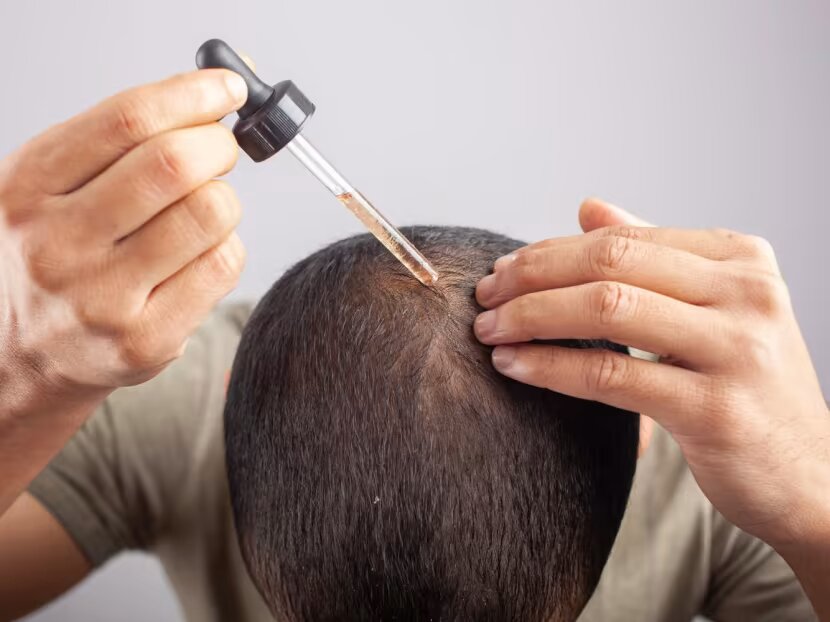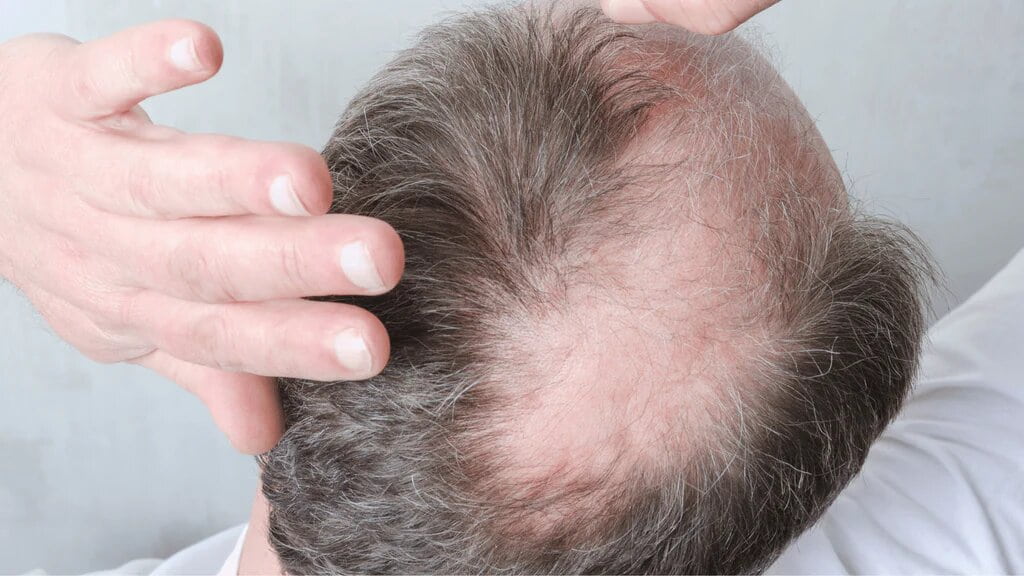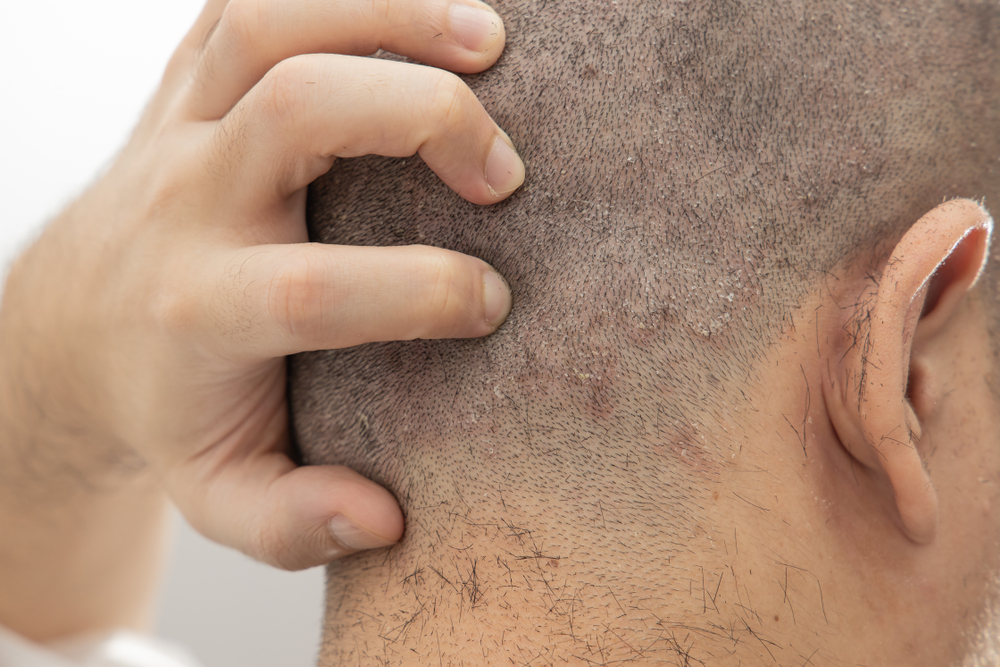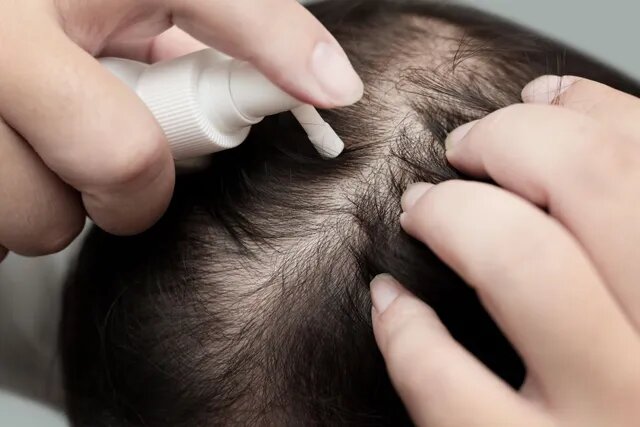Are you struggling with hair loss and searching for an effective solution?
Minoxidil can cause an itchy scalp due to its alcohol content and potential allergic reactions.
In this article, we delve into the intricacies of minoxidil, exploring its mechanism of action, typical side effects, and its unfortunate association with scalp itchiness.
What Is Minoxidil?

Minoxidil is a medication primarily used to treat hair loss and promote growth. It is available in topical or foam form and applied directly to the scalp. Minoxidil works by widening blood vessels and opening potassium channels, stimulating hair follicles to grow thicker and longer strands. It is commonly used to treat male and female pattern baldness and is available over the counter without a prescription.
Why Does Minoxidil Cause An Itchy Scalp?
1. Alcohol Content:
Many minoxidil solutions contain a high percentage of alcohol, which serves as a vehicle to help the medication penetrate the skin. However, this alcohol can sometimes irritate the scalp, leading to itching and discomfort.
2. Allergic Reactions:
Some individuals may be allergic to minoxidil or other ingredients in the formulation. Allergic reactions can manifest as itching, redness, and even swelling of the scalp.
3. Dryness And Flakiness:
Minoxidil can disrupt the natural balance of oils on the scalp, leading to dryness and flakiness. This dryness can cause itching and irritation, especially in individuals with sensitive skin.
Understanding Minoxidil And Its Effects:

1. Mechanism Of Action:
When applied topically to the scalp, minoxidil penetrates the skin and stimulates blood flow to the hair follicles. This increased blood flow delivers essential nutrients and oxygen to the follicles, promoting hair growth.
Common Side Effects:
- Scalp Irritation
One of minoxidil’s most common side effects is scalp irritation, which can manifest as itching, redness, or discomfort. This irritation is often due to the alcohol content in minoxidil solutions, which may cause dryness and irritation of the scalp.
- Dryness and Flakiness
Minoxidil can disrupt the natural balance of oils on the scalp, leading to dryness and flakiness. This can result in itching and irritation, particularly in individuals with sensitive skin.
- Redness
Some users may experience redness of the scalp as a side effect of minoxidil. This redness is usually mild and temporary but can bother some individuals.
- Increased Hair Shedding
In the initial stages of minoxidil treatment, some users may experience increased hair shedding. This is a normal part of the hair growth cycle and often resolves after a few weeks of treatment.
- Heart Palpitations
In rare cases, minoxidil can cause heart palpitations or a rapid heartbeat. If you experience any cardiovascular symptoms while using minoxidil, seek medical attention immediately.
The Connection Between Minoxidil And Scalp Itchiness:

1. Alcohol Content:
Irritation Due to Alcohol: Many minoxidil solutions contain high alcohol levels, which can irritate the scalp and lead to itching.
2. Allergic Reactions:
Potential Allergies: Some individuals may have allergic reactions to minoxidil or its components, resulting in scalp itchiness, redness, or swelling.
3. Dryness And Flakiness:
Disruption of Scalp Balance: Minoxidil can disrupt the natural balance of oils on the scalp, causing dryness and flakiness and contributing to itchiness.
Tips To Alleviate Minoxidil-Induced Scalp Itchiness:
1. Proper Application Techniques:
Even Distribution: Ensure that minoxidil is applied evenly across the scalp to prevent concentrated areas of irritation.
Correct Dosage: Use the recommended amount of minoxidil to avoid overapplication, which can exacerbate itchiness.
Gentle Massage: Massage the minoxidil gently into the scalp to promote absorption without causing additional irritation.
2. Moisturizing The Scalp:
Hydrating Shampoos: Use moisturizing shampoos and conditioners to keep the scalp hydrated and prevent dryness.
Scalp Treatments: Use scalp treatments to moisturize and soothe irritated skin.
Natural Oils: Apply natural oils such as coconut or jojoba oil to the scalp to replenish moisture and reduce itchiness.
3. Consider Minoxidil Alternatives:
Consult a Dermatologist: If scalp itchiness persists despite preventive measures, consult a dermatologist to explore alternative hair loss treatments.
Prescription Medications: Discuss prescription medications or topical treatments with a dermatologist that may be better tolerated by individuals prone to scalp irritation.
Natural Remedies: Explore natural remedies for hair loss, such as saw palmetto or essential oils, as potential alternatives to minoxidil.
Alternative Treatment Options:

If minoxidil is unsuitable for you due to scalp itchiness or other side effects, a dermatologist can suggest alternative treatment options for managing hair loss. These may include prescription medications, topical treatments, or procedural interventions tailored to your circumstances.
FAQ’s:
1. Is Scalp Itchiness A Common Side Effect Of Minoxidil?
Yes, scalp itchiness is a common side effect experienced by some minoxidil users. It usually occurs due to irritation or dryness of the scalp.
2. How Can I Alleviate Scalp Itchiness While Using Minoxidil?
You can alleviate scalp itchiness by following proper application techniques, moisturizing the scalp regularly, and considering alternative treatments if necessary.
3. Is Scalp Itchiness A Sign That Minoxidil Is Not Working For Me?
Not necessarily. Scalp itchiness is often a temporary side effect that can occur during the initial stages of minoxidil treatment. It does not necessarily indicate that the medication is ineffective.
4. Should I Stop Using Minoxidil If I Experience Scalp Itchiness?
It depends on the severity of your symptoms. Mild scalp itchiness can often be managed with simple interventions, but if the itching persists or becomes severe, it’s essential to consult a dermatologist for guidance.
5. Are There Alternative Treatments For Hair Loss Besides Minoxidil?
Yes, several alternative hair loss treatments exist, including prescription medications, topical treatments, and procedural interventions. Consult a dermatologist to explore the options best suited to your needs.
6. How to stop your scalp itching with Minoxidil
To alleviate scalp itching caused by Minoxidil, try using a lower concentration formula, washing your scalp regularly, and moisturizing with a gentle, non-irritating product to soothe irritation and dryness.
7. Is Rogaine supposed to make your head itch?
Itching of the scalp is a common side effect of Rogaine (Minoxidil), usually due to its alcohol content or irritation from the solution. It may subside over time or with reduced frequency of use.
8. What are the side effects of too much Minoxidil?
Excessive use of Minoxidil can lead to side effects such as scalp irritation, redness, and itching, as well as dizziness, rapid heartbeat, or unwanted hair growth in other body areas.
9. Does an itchy scalp mean my hair is growing?
An itchy scalp doesn’t necessarily indicate hair growth; it could be a reaction to Minoxidil or other factors like dryness or irritation. Monitor your scalp’s condition and consult a dermatologist if concerns persist.
10. How can you tell if Minoxidil is working?
Signs that Minoxidil is working include decreased hair shedding, increased hair density, and regrowth in previously bald areas. However, individual responses may vary, so be patient and consistent with treatment.
11. Minoxidil Treatment and Side Effects
Minoxidil treatment can lead to both positive effects like hair regrowth and potential side effects such as scalp irritation, itching, and unwanted hair growth on other body parts, requiring careful monitoring and adjustment.
Conclusion:
Scalp itchiness is a common side effect of minoxidil use, but it can often be adequately managed. By understanding the causes of scalp itchiness and implementing preventive measures, you can continue to reap the benefits of minoxidil for hair growth while minimizing discomfort. Remember to consult a dermatologist if you experience persistent or severe scalp itchiness to explore alternative treatment options and ensure the health of your scalp.
